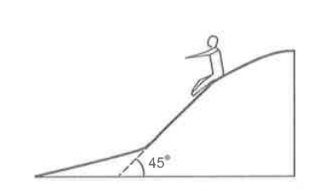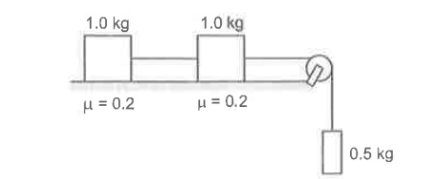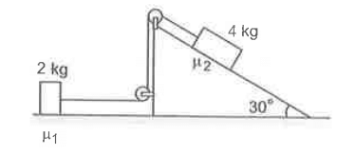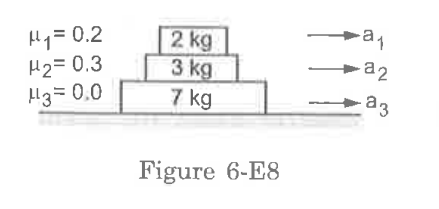Exercises from HC VERMA FRICTION for Class 11
| Class 11 | PHYSICS |
| Chapter | FRICTION |
| HC VERMA | Exercises |
| Medium | English |
| Academic Year | 2023-2024 |
Question 7
A body of mass 2 kg is lying on rough inclined plane of inclination 30 degree . Find the magnitude of the force parallel to the incline needed to make the block move a. up the incline b. down the incline. Coefficient of static friction =0.2
Repeat part a. of problem 6 if the push is applied horizontally and not parallel to the incline.View SolutionQuestion 14
In the section 3.7.3 (Banking of road) we have not included the friction exerted by the road on the car. Suppose the coefficient of static friction between the car tyre and the surface of the road is μs, calculate the minimum speed with which the car can take safe turn? When the car takes turn in the banked road, the following three forces act on the car. (1) The gravitational force mg acting downwards (2) The normal force N acting perpendicular to the surface of the road (3) The static frictional force f acting on the car along the surface.View SolutionQuestion 15
The friction coefficient bettween an athelete's shoes and the ground is 0.90. Suppose a superman wears these shoes and races for 50 m. There is no upper limit in his capacity of running at high speeds. A. Find the minimum time that he will have to take in completing the 50 m starting from rest. b. Suppose he takes exactly this minimum time to complete the 50 m, what minimum time will he take to stop?View SolutionQuestion 18
Figure shows tow blocks in contact sliding down an inclined surface of inclination 300. The friction coefficient between the block o fmass 2.0 kg and the incline is μ1 and that between the block of mas 4.0 kg and the incline is μ2. Calculate teh acceleration of the 2.0 kg bloc if a. μ1=0.20andμ2=0.30b.μ1=0.30andμ2=0.20.Take g=10ms2.
 View Solution
View SolutionQuestion 24
The friction coefficient between the two blocks shown in figure is μ but the floor is smooth. A. What maximum horizontal force F can be applied without disturbing the equilibrium of the systme? b.suppose the horizontal force applied is double of that found in part a. Findthe accelerations of the two masses.
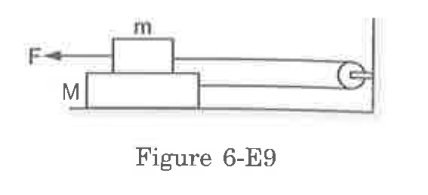 View Solution
View SolutionQuestion 26
Consider the situation shown in figure. Suppose a small electric field E exists in the space in the vertically upward direction and the upper block carries a positive charge Q on its top surface. The friction coefficient between the two blocks is μ but teh floor is smooth. what maximum horizontal force F can be applied without disturbing the equilibrium?
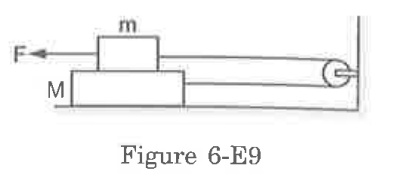 View Solution
View SolutionQuestion 27
A block of mass m slips on a rough horizontal table under the action of horiozontal force applied to it. The coefficient of friction between the block and the table is μ. The table does not move on the floor. Find the total frictional force aplied by the floor on the legs of the table. Do you need the friction coefficient between the table and the floor or the mass of the table ?
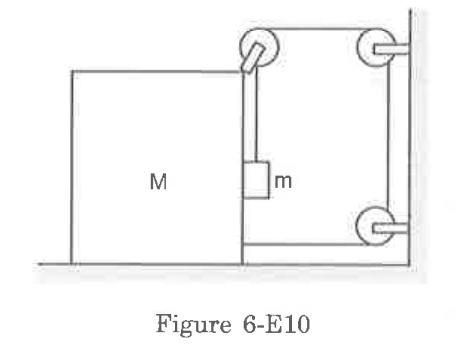 View Solution
View SolutionQuestion 29
A block of mass 2 kg is pushed against a rough vertical wall with a force is 40 N. Coefficient of static friction being 0.5. Another horizontal force is 15 N, is applied on the block in a direction parallel to the wall. Will the block move? If yes in which direction? If no, find the frictional force exerted by the wall on the block.View SolutionQuestion 30
A person (40 kg) is managing to be at rest between two verticle walls by pressing one wall A by hi hands and feet and the other wall B by his back figure. Assume that the friction coefficient between his body and the walls is 0.8 and that limiting friction acts at all the contacts. a. show that the person pushes the two walls with equal force. b. find the normal force exerted by either wall on the person Take g=10ms2.
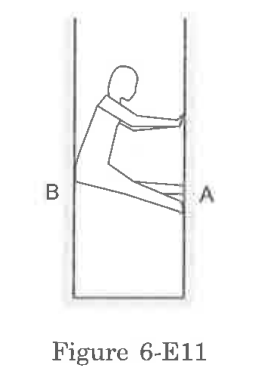 View Solution
View SolutionQuestion 31
Figure shows a small block of mass m kept at the left end of a larger block of mass M and length l. The system canslide on a horizontal road. The system is started towards right with an initia velocity v. The friction coefficient between the road and the bigger block is μ and that between the block is μ2. Find the time elapsed before the smaller blocks separates from the bigger block.
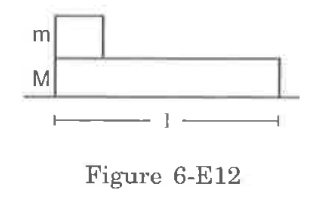 View Solution
View Solution
All Exercises from HC VERMA Class 11 PHYSICS FRICTION
- EXERCISES
- EXERCISES
- EXERCISES
- EXERCISES
- EXERCISES
- EXERCISES
- EXERCISES
- EXERCISES
- EXERCISES
- EXAMPLES
- EXAMPLES
- EXAMPLE
- EXAMPLES
- EXAMPLES
- EXAMPLE
- EXAMPLES
- EXAMPLES
- EXAMPLE
- OBJECTIVE 1
- OBJECTIVE 1
- OBJECTIVE -1
- OBJECTIVE 1
- OBJECTIVE 1
- OBJECTIVE -1
- OBJECTIVE 1
- OBJECTIVE 1
- OBJECTIVE -1
- OBJECTIVE 2
- OBJECTIVE 2
- OBJECTIVE -2
- OBJECTIVE 2
- OBJECTIVE 2
- OBJECTIVE -2
- OBJECTIVE 2
- OBJECTIVE 2
- OBJECTIVE -2
- SHORT ANSWER
- SHORT ANSWER
- QUESTIONS FOR SHORT ANSWER
- SHORT ANSWER
- SHORT ANSWER
- QUESTIONS FOR SHORT ANSWER
- SHORT ANSWER
- SHORT ANSWER
- QUESTIONS FOR SHORT ANSWER
- WORKED OUT EXAMPLES
- WORKED OUT EXAMPLES
- WORKED OUT EXAMPLES
- WORKED OUT EXAMPLES
- WORKED OUT EXAMPLES
- WORKED OUT EXAMPLES
- WORKED OUT EXAMPLES
- WORKED OUT EXAMPLES
- WORKED OUT EXAMPLES
